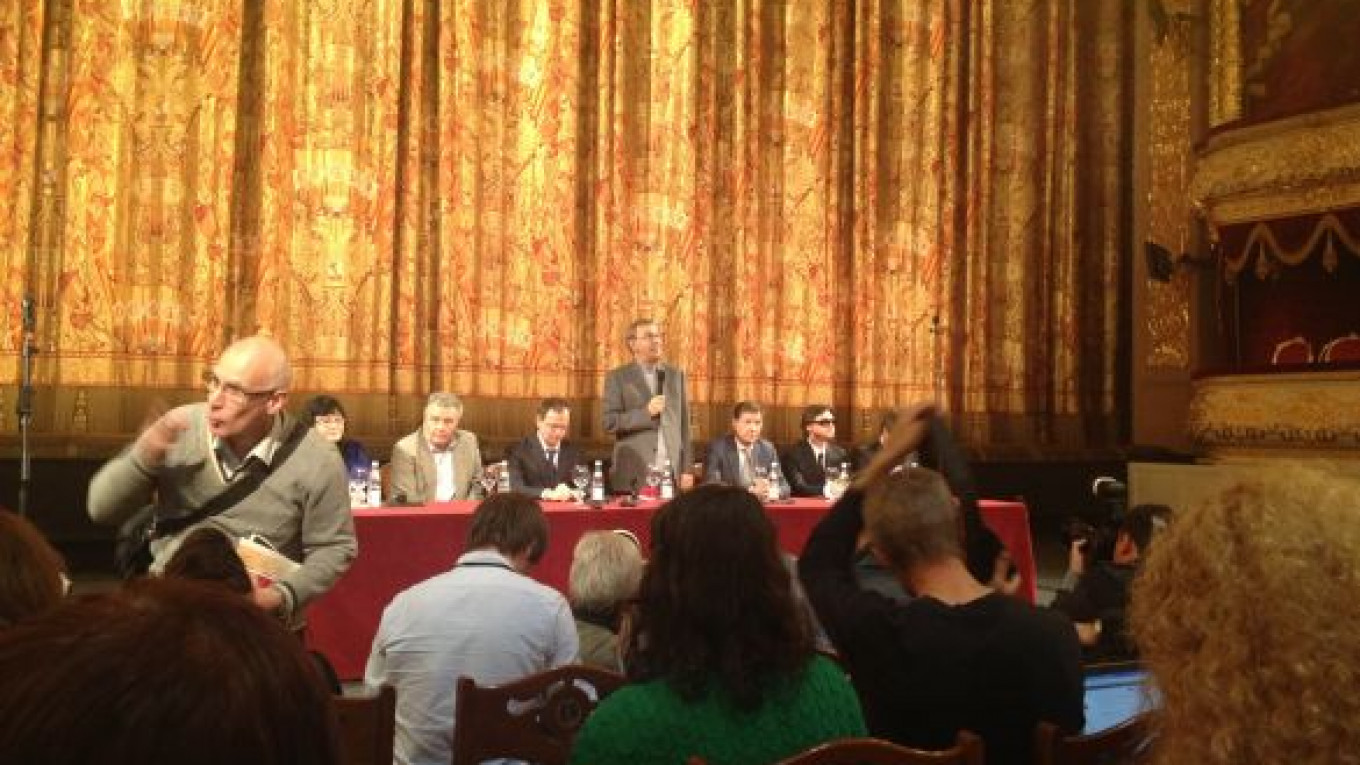The Bolshoi Theater opened its 238th season Tuesday with a performance at its New Stage of Pyotr Tchaikovsky's opera "The Queen of Spades." Ahead of it, between now and next July, lie three entirely new stagings of ballet and two of opera, as well as the revival of two productions of opera from the past.
The Bolshoi's dance troupe, fresh from a triumphant three-week visit to London, returns to the theater Sept. 27 with a performance on the theater's Main Stage of Tchaikovsky's "Swan Lake" that features prima ballerina Svetlana Zakharova and American premier danseur David Hallberg, who makes his return to the Bolshoi after a season away due to injury.
First up on the list of new ballet productions is "Marco Spada," set to a score by Daniel-Francois-Esprit Auber, in a reconstruction of its original 1857 Paris staging by French choreographer Pierre Lacotte, already well-known to Moscow audiences for his captivating reconstructions of two other mid-19th-century ballets, Marius Petipa's "The Pharaoh's Daughter" at the Bolshoi and Filippo Taglioni's "La Sylphide" at the Stanislavsky and Nemirovich-Danchenko Musical Theater.
Lacotte's version of "Marco Spada" was originally produced for the Rome Opera in 1981, with Rudolf Nureyev dancing the lead role. For Moscow, Lacotte has considerably revised the staging, principally to take advantage of the larger troupe of dancers available at the Bolshoi. The production opens Nov. 8.
Next March will see the premiere of Hamburg Ballet director John Neumeier's "Lady of the Camellias," a work set to music of Frederic Chopin and derived from a novel of the same name by Alexandre Dumas that also served as the basis for Giuseppe Verdi's opera "La Traviata." Since its debut at the Stuttgart Ballet in 1978, "Lady of the Camellias" has been staged by numerous other ballet companies throughout the world and the bedroom duet of its main protagonists has appeared on many a gala dance program in Moscow.
The season's third new ballet production, due at the beginning of next July, is "The Taming of the Shrew," a work being created especially for the Bolshoi by Frenchman Jean-Christophe Maillot as well as the first ballet the choreographer has devised for any company other than Monaco's Ballets de Monte-Carlo, of which he has been director since 1993.? ?
The current year marks the bicentennial of the birth of the 19th century's two greatest composers of opera, Richard Wagner and Giuseppe Verdi, and the Bolshoi is set to honor both of them between now and December.
On Oct. 16, the theater revives Wagner's "The Flying Dutchman" in the highly unconventional but thoroughly engaging version created for it in 2004 by German director Peter Konwitschny. Due to make his Bolshoi debut in the title role is the well-regarded Canadian bass-baritone Nathan Berg. American soprano Mardi Byers, who made a memorable debut at the theater in its 2009 production of Alban Berg's "Wozzeck," is scheduled to sing the lead soprano role of Senta.
Verdi's turn comes Dec. 17, when Bolshoi unveils a new production of "Don Carlo," a very large-scale and complex opera originally produced in Paris and set to a French libretto. The Bolshoi will presumably be presenting it in one of the revised versions the composer later set to a text in Italian. Staging "Don Carlo" will be British director Adrian Noble, former head of the Royal Shakespeare Company, whose operatic productions have appeared on such prestigious stages as those of New York's Metropolitan Opera, the Rome Opera and the Vienna State Opera.
Both operas are to be led by Bolshoi musical director and principal conductor Vasily Sinaisky, who in each case faces a greater challenge than any he has so far encountered since his appointment three years ago. ?
February of next year brings a revival of Nikolai Rimsky-Korsakov's opera "The Tsar's Bride," in the realistic period decor, much beloved by Moscow audiences, which was created in 1966 to designs by Fyodor Fyodorovsky, but in a revised staging by Israeli director Julia Pevzner. Sinaisky is again due to conduct.
The second all-new opera production of the season is Wolfgang Amadeus Mozart's "Cosi fan tutte," due at the end of next May. Staging it will be the young Dutch director Floris Visser, but its conductor, rather curiously, has yet to be named. As anyone who watched the brilliant documentary recently shown on cable TV channel Mezzo of the recording of "Cosi fan tutte" by the Perm Opera under the baton of Teodor Currentzis will surely understand, the opera absolutely requires the services of a conductor thoroughly versed in both its music and the nuances of its drama. The success or failure of the Bolshoi's "Cosi" will no doubt depend in large part on who it ultimately chooses to conduct.
Contact the author at artsreporter@imedia.ru


